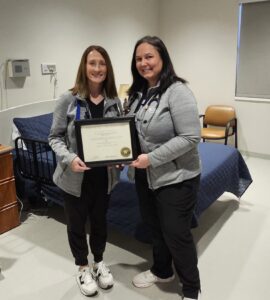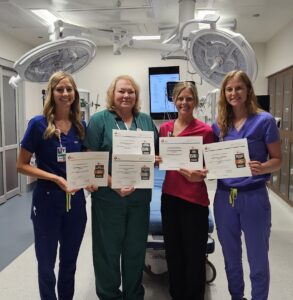ABOUT US
Newsletter
Check out our hospital newsletter and remain current on news, events and activities going on at Nemaha Valley Community Hospital and Seneca Family Practice!
NVCH Successfully Passes Sleep Lab Accreditation Survey

Nemaha Valley Community Hospital (NVCH) is pleased to announce that it has successfully passed its recent Accreditation Commission for Health Care (ACHC) Sleep Lab survey, reaffirming the hospital’s commitment to providing high-quality, safe, and effective sleep diagnostic services for patients in the region.
The accreditation survey evaluated NVCH’s sleep lab operations, including patient care practices, clinical protocols, staff qualifications, equipment, and compliance with nationally recognized standards. Successfully meeting these rigorous requirements demonstrates NVCH’s ongoing dedication to excellence in sleep medicine and patient-centered care. NVCH congratulates Dawn Osterhaus, RRT, Director of Respiratory Therapy, and Danielle Dalinghaus, CRT, for fulfilling the high standards required to achieve accreditation for the hospital’s in-house sleep lab.
Sleep disorders, including sleep apnea and other breathing-related conditions, can significantly impact overall health and quality of life. NVCH’s accredited sleep lab allows patients to receive trusted diagnostic testing close to home, reducing the need to travel while ensuring access to comprehensive, evidence-based care. The hospital’s continued investment in specialized services supports early diagnosis, effective treatment planning, and improved long-term outcomes.
“This achievement reflects the hard work and dedication of our sleep lab team and the hospital’s broader commitment to quality,” said Kiley Floyd, CEO. “We are proud to offer accredited sleep services locally and to continue expanding access to specialized care for our community.”
NVCH remains committed to maintaining accreditation standards and continuously improving services to meet the evolving needs of patients across Nemaha County and surrounding areas.
NVCH is Nationally Recognized for its Commitment to Providing High-Quality Cardiovascular Care

Nemaha Valley Community Hospital (NVCH) has received five American Heart Association Get With The Guidelines® achievement awards for demonstrating commitment to following up-to-date, research-based guidelines for the treatment of heart disease and stroke, ultimately leading to more lives saved, shorter recovery times and fewer readmissions to the hospital.
Heart disease and stroke are the No. 1 and No. 5 causes of death in the United States, respectively, according to the American Heart Association 2025 Statistical Update. Studies show patients can recover better when providers consistently follow treatment guidelines.
Get With The Guidelines put the expertise of the American Heart Association and American Stroke Association to work for hospitals nationwide, helping ensure patient care is aligned with the latest evidence- and research-based guidelines. As a participant in Get With The Guidelines programs, NVCH qualified for the awards by demonstrating how their organization has committed to improving quality care.
“Nemaha Valley Community Hospital is dedicated to enhancing patient care by following the latest evidence-based treatment guidelines and improving processes to deliver prompt, effective care for heart attacks and strokes,” said Dana Kohake, NVCH Director of Nursing. “The Get With The Guidelines program empowers our team to apply proven clinical practices every day, helping more individuals in Nemaha County and surrounding communities live longer, healthier lives.”
This year, NVCH received these achievement awards:
- Get With The Guidelines®-Rural Heart Failure – Bronze
- Get With The Guidelines®-Rural Coronary Artery Disease STEMI – Silver
- Get With The Guidelines®-Rural Coronary Artery Disease NSTE-ACS – Bronze
- Get With The Guidelines®-Coronary Artery Disease STEMI Referring – Silver
- Get With The Guidelines®-Rural Stroke – Silver
“These awards show NVCH’s commitment to caring for those in their community who need cardiovascular care,” said Donald Lloyd-Jones, past volunteer president of the American Heart Association and current volunteer chair of the Association’s Quality Oversight Committee. “By following the American Heart Association’s quality improvement protocols, NVCH can help realize our shared vision of improved patient outcomes, fewer readmissions and lower mortality rates — a win for health care systems, families and communities.”
About Get With The Guidelines
Get With The Guidelines® is the American Heart Association/American Stroke Association’s hospital-based quality improvement program that provides hospitals with the latest research-based guidelines. Developed with the goal of saving lives and hastening recovery, Get With The Guidelines has touched the lives of more than 14 million patients since 2001. For more information, visit heart.org.
In-Lab Sleep Study: What’s in it for YOU?
A lot goes on in your brain and in your body while you sleep. Tracking this activity during a sleep study can help your doctor diagnose and treat a variety of sleep disorders, including sleep apnea, narcolepsy, restless legs syndrome, insomnia, and nighttime behaviors like sleepwalking and REM sleep behavior disorder.
A sleep study is a non-invasive, overnight exam that allows a sleep lab technician to monitor you while you sleep to see what’s happening in your brain and body. Sleep studies can be done in-lab or in-home. In-home sleep studies allow you to do the testing in the comfort of your own bed, but in-lab sleep studies provide a more detailed study and diagnose a broader range and severity of sleep disorders.
“An in-lab sleep study permits more detailed monitoring of the patient’s brainwaves, oxygen saturation, leg motion, heart rate, respiratory effort and airflow and other critical benchmarks for diagnosing many sleep disorders such as REM sleep disorders and insomnia,” said NVCH Respiratory Therapy Director Dawn Osterhaus, RRT. “In-home studies are limited to the diagnosis of only obstructive sleep apnea and cannot detect other sleep disorders.”
Sleep studies at Nemaha Valley Community Hospital (NVCH) are completed by one of our trained sleep lab technicians. The studies are usually scheduled for evening and night hours (7 p.m. to 6 a.m.) in one of our private sleep study rooms. “I arrived for my sleep study and Dawn got me set up for the evening, she explained everything in detail before I settled in for the night,” said Mark Studer who recently had a sleep study at NVCH. “I was comfortable and fell asleep right away.”
If the sleep technician suspects that you have obstructive sleep apnea, you may wear a continuous positive airway pressure (CPAP) machine during the second half of the night in the sleep lab. The technician will adjust the machine and monitor to see if it improves your sleep. “Within the first couple of hours Dawn noticed my oxygen levels dropping so she woke me up and fitted me for a CPAP, I slept great the rest of the night,” said Studer.
Studer also mentioned that after his sleep study Dawn reviewed his results with him in detail, helped get him fitted with the proper face mask for his CPAP machine and continues to check in with him frequently to make sure that everything is going well, and he is continuing to feel good. “Dawn and Danielle are incredibly helpful, caring and very knowledgeable,” commented Studer.
When asked about what symptoms prompted the need for Studer’s sleep study he mentioned waking up exhausted with a dry throat and continuing to feel tired throughout the day. He also remembers struggling to stay awake behind the wheel. Studer was aware that these symptoms were not normal, so he scheduled an appointment with his SFP primary care physician to discuss his options to improve his health and wellbeing. After meeting with Dr. Bartkoski, it was determined that a sleep study was necessary, so Dr. Bartkoski made the referral, and it was scheduled shorty after that. “It was an incredibly easy process,” said Studer.
If you are experiencing sleep issues or daytime symptoms such as fatigue, drowsiness, depression, or difficulty concentrating, schedule an appointment with your doctor today. These symptoms often have an underlying issue, and your doctor can help you determine whether a sleep study is right for your health and wellbeing. For additional information about in-lab or in-home steep studies at NVCH please contact Dawn or Danielle at 785-336-0589.
YOUR Mental Health Matters
Since the start of the pandemic, more and more people are talking about mental health. An increasing number of folks are starting to see it for what it is: one important component of your overall health and well-being, just like your physical health. But mental health conditions, resources, and conversations can still feel complicated and out of reach.
Are there common warning signs for mental health conditions or crises? Are there specific factors that can lead to mental health conditions or even crises? What resources are out there – and how do I know if they’re right for me?
Many people are learning about mental health topics for the first time. Having a widespread understanding of the topic can help you be more informed if you or someone you know is experiencing a mental health condition or crisis.
Around half of people in the U.S. will meet the criteria for a diagnosable mental health condition at some point in their life, so everyone should know what to look out for.
Everyone should have the support needed to thrive. There’s often no one single cause for a mental health condition. Instead, there are many possible risk factors that can influence how likely a person is to experience a mental health condition or how serious the symptoms may be.
Some risk factors for mental health conditions include: trauma, which can be a one-time event or ongoing; your environment and how it impacts your health and quality of life (also known as social determinants of health like financial stability and health care access); genetics; brain chemistry; and your habits and lifestyle such as a lack of sleep.
Of course, understanding the risk factors for a mental health condition can be more difficult when it’s your own mental health. Take time to ask yourself about your thoughts, feelings, and behaviors to see if this is part of a pattern that may be caused by a mental health condition. Here are some questions to get you started:
- Have things that used to feel easy started feeling difficult?
- Does the idea of doing daily tasks like making your bed now feel really, really hard?
- Have you lost interest in activities and hobbies you used to enjoy?
- Do you feel irritated, possibly to the point of lashing out at people you care about?
Our society focuses much more on physical health than mental health, but both are equally important. If you are concerned about your mental health, there are several options available. You are not alone – help is out there, and recovery is possible. It may be hard to talk about your concerns, but simply acknowledging to yourself that you’re struggling is a really big step.
Please contact your SFP physician at 785-336-6107 for additional information. If you’re struggling with your mental health we are here to provide support and help you find the right tools to improve you mental health and increase your resiliency.
